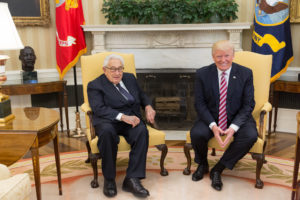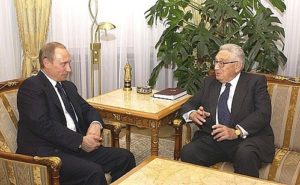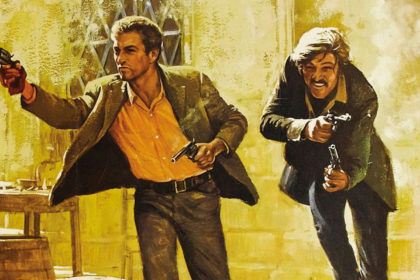Henry Alfred Kissinger is an American statesman, political scientist, diplomat and geopolitical consultant who served as the United States Secretary of State and National Security Advisor under the presidential administrations of Richard Nixon and Gerald Ford. Take a look below for 30 more fun and interesting facts about Henry Kissinger.
1. A Jewish refugee who fled Nazi Germany with his family in 1938, he became National Security Advisor in 1969 and United States Secretary of State in 1973.
2. For his actions negotiating a ceasefire in Vietnam, Kissinger received the 1973 Nobel Peace Prize under controversial circumstances, with two members of the committee resigning in protest.
3. Kissinger later sought, unsuccessfully, to return the prize after the ceasefire failed.
4. A practitioner of Realpolitik, Kissinger played a prominent role in United States foreign policy between 1969 and 1977.
5. During 1969 and 1977, he pioneered the policy of detente with the Soviet Union, orchestrated the opening relations with the People’s Republic of China, and negotiated the Paris Peace Accords, ending American involvement in the Vietnam War.

6. Kissinger has also been associated with such controversial policies as U.S. involvement in a military coup in Chile and U.S. support for Pakistan during the Bangladesh War despite a genocide.
7. After leaving government, he formed Kissinger Associates, an international geopolitical consulting firm.
8. Kissinger has been a prolific author of books on diplomatic history and international relations with over one dozen books authored.
9. He remains a controversial figure in recent American history.
10. Some journalists, activists, and human rights lawyers have condemned Kissinger as a war criminal.
11. In a 2014 survey, many scholars and foreign policy experts ranked Kissinger as the most effective U.S. Secretary of State since 1965.
12. Kissinger was born on May 27, 1923, in Furth Bavaria, Germany, into a Jewish family.

13. His father, Louis Kissinger, was a schoolteacher and his mother, Paula Kissinger, was a homemaker.
14. In 1938, because of Nazi persecution, his family had to move to London, England, and finally to New York.
15. After completing high school, he enrolled in the City College of New York, as a part time student. However, his studies were interrupted in early 1943, as he had to be drafted into the army.
16. During the American advance into Germany, Kissinger, though he was only a private, was put in charge of the administration of the city of Krefeld, as there was lack of German speakers on the division’s intelligence staff. He established a civilian administration within eight days, which earned him the rank of sergeant.
17. Later, he was given a charge of a team in Hanover to track down Gestapo officers and other saboteurs. For this, he was awarded the Bronze star.
18. In 1945, he was made commandant of the Bansheim metro CIC detachment, Bergstrasse district of Hesse, for de-Nazification of the area.
19. Despite having absolute authority and powers of arrest, Kissinger took care to avoid abuses against the local population. Next year, he was reassigned to teach at the European Command Intelligence School at Camp King.

20. He received his BA degree in political science from Harvard College in 1950, and later his MA and PhD from Harvard University in 1951 and 1952 respectively.
21. After finishing his studies, Kissinger remained at Harvard as a member of the faculty in the Department of Government.
22. From 1958 to 1971, he served as director of the Harvard Defense Studies Program. He also served as a consultant to several government agencies like the Operations Research Office.
23. Kissinger became an advisor to Nelson Rockefeller and supported his bid for the Republican nomination for president in 1960, 1964 and 1968.
24. Under his guidance, the U.S. government also supported the Bangladesh Liberation War in 1971. It was mainly because of his concern about the increasing influence of the Soviet Union in South Asia.
25. “Nuclear Weapons and Foreign Policy” published in 1957 is one of his most important works. The book is about American nuclear weapons policy of the Kennedy Administration, as well as about how the American government has conducted war since the World War II.

26. Kissinger was given the U.S. Senator John Heinz Award for Greatest Public Service by en Elected or Appointed Official in 1974. This award is given annually by Jefferson Awards.
27. He was made an honorary knight of the British Empire in 1995.
28. In 2012, he received Israel’s President Medal.
29. Kissinger married Ann Fleischer in 1949. They had two children, Elizabeth and David. They divorced in 1964.
30. Ten years after his divorce from Ann, he married Nancy Maginnes. They have been married for more than 40 years.




